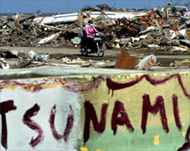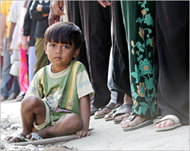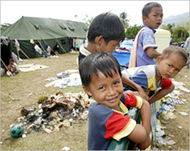Traumatised Aceh youth return to class
Schools in tsunami-ravaged parts of Aceh reopened on Wednesday to teachers without students, pupils missing their instructors and classrooms either buried in mud or reduced to rubble.

“The devastation to the education system in Aceh province is unprecedented,” the Indonesian People’s Welfare Minister Alwi Shihab said on Tuesday.
“Tens of thousands of children are missing and more than 100,000 children have been displaced. These children lost everything, their parents, family, houses, schools and teachers.”
More than 1750 teachers were among the estimated 172,000 people who died in the aftermath of the 26 December magnitude 9.0 earthquake and ensuing tsunami, the Indonesian government says.
A quarter of the teachers in the provincial capital Banda Aceh perished. Thousands of others were left homeless or lost members of their own families.
Healing touch
The government reports up to 1100 schools in Aceh were destroyed, and if the loss of text books and teaching materials are factored in, 520,000 children in a province of 4.2 million people have been directly touched by the tsunami.
 |
|
The natural disaster killed a full |
Indonesian authorities rushed to reopen schools a month after the tsunami, in some cases against the recommendations of international humanitarian agencies, in order to help children and educators cope with the trauma of losing family and friends, according to Anas Adam, the education ministry’s official heading education-reconstruction efforts.
“The schools are the most effective place to reach the children and help them deal with their trauma, but also the teachers,” Adam said. “Sometimes people forget how badly they have been hurt too.”
The head of Unicef’s emergency education services agreed that schools play a key role in restoring a sense of normalcy to otherwise extraordinary circumstances.
“We know from past experience that it is very important for children who have undergone an enormously traumatic experience, to return to school, to get back to some sort of normal routine,” Sarah Lendon said.
“It is far better that they be in the presence of a teacher they respect than sitting around in the camps day after day.”
Cutting class
The first step was the resumption of classes in roughly 130 schools in Banda Aceh and the district of Greater Aceh, and to a lesser extent the coastal towns of Sigli, Meulaboh and Calang.
One did not have to go far, though, to find children missing class.
|
“There’s no point going to school now because my family has no house and I have no clothes” Rudy, 11 |
“My school was destroyed, so I have nowhere to go,” eleven-year-old Faridah, who sells cold drinks outside the offices where education officials on Tuesday touted the school openings, said. “There is no information about what we are supposed to do.”
A business competitor had his own reasons for cutting class.
“There’s no point going to school now because my family has no house and I have no clothes,” Rudy, 11, said as he dug change for a pack of cigarettes out of his pocket. “We need money for food because my father’s fishing boat was destroyed.”
The final price tag for rebuilding the schools and restoring teaching aids and textbooks could top $120 million, Adam says.
Daunting task
Efforts are focused on accelerating teacher training, recruiting new teachers, cleaning schools that have not been completely destroyed and providing counseling to both students and teachers.
 |
|
The tsunami touched the lives of |
It will be an enormous task. Even before the tsunami, Aceh’s education system, like that of much of the country, was in an advanced state of decay.
More than 1100 schools have been destroyed in the past six years of fighting between the Indonesian armed forces and the separatist Free Aceh Movement, which began firebombing government buildings in Aceh in 1999. No serious effort has been made to rebuild them.
Over the past decade the resource-rich province slid from being one of the country’s most prosperous areas to one of its five most needy, the World Bank reports.
A special autonomy package has delivered an estimated $2.1 billion in oil and natural gas revenues into the provincial government treasury over the past three years, but there’s little evidence of it being spent on infrastructure.
Corruption fears
The road system is among the worst in the country; electricity and running water is erratic or unavailable in areas away from the main highways; and the failure to upgrade port facilities now washed away in the tsunami, is a constant complaint of fishermen and merchants.
|
“I hope I can go back to my village some day to look for my family and my friends because I still miss them very much” Aan Alanurmouth, 9 |
There is also concern that the roughly $4.2 billion in aid pledged by the international community to Indonesia’s post-tsunami reconstruction will be pillaged by unscrupulous businesspeople and politicians.
Transparency International ranks Indonesia among the top 10 most corrupt countries in the world.
The current governor, Abdullah Puteh, is in prison in Jakarta awaiting trial on corruption charges, and the last mayor of Banda Aceh died when the tsunami destroyed Banda Aceh’s Kuda prison where he was serving a two-year sentence for embezzlement.
The complexities of the future were lost on nine-year-old Aan Alanurmouth. His parents, siblings, grandparents and playmates all died with a 10m high wall of water erased the fishing village of Blang Cut from the map of west Aceh.
Back to school
 |
|
More than 100,000 children have |
Alanurmouth’s uncle Elfian, a retired postman living in Banda Aceh, discovered him eight days after the tsunami, living in a tent city that sprang up outside a television station.
His aunt is a teacher, so the grade three student was up before dawn on Wednesday preparing for the first day of classes.
“I am happy to go back to school,” he said shyly before walking off to a local elementary school in a new set of clothes donated by neighbours.
“I hope I study English and geography because they are my favourite subjects. I hope I can go back to my village some day to look for my family and my friends because I still miss them very much.”